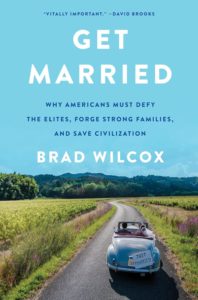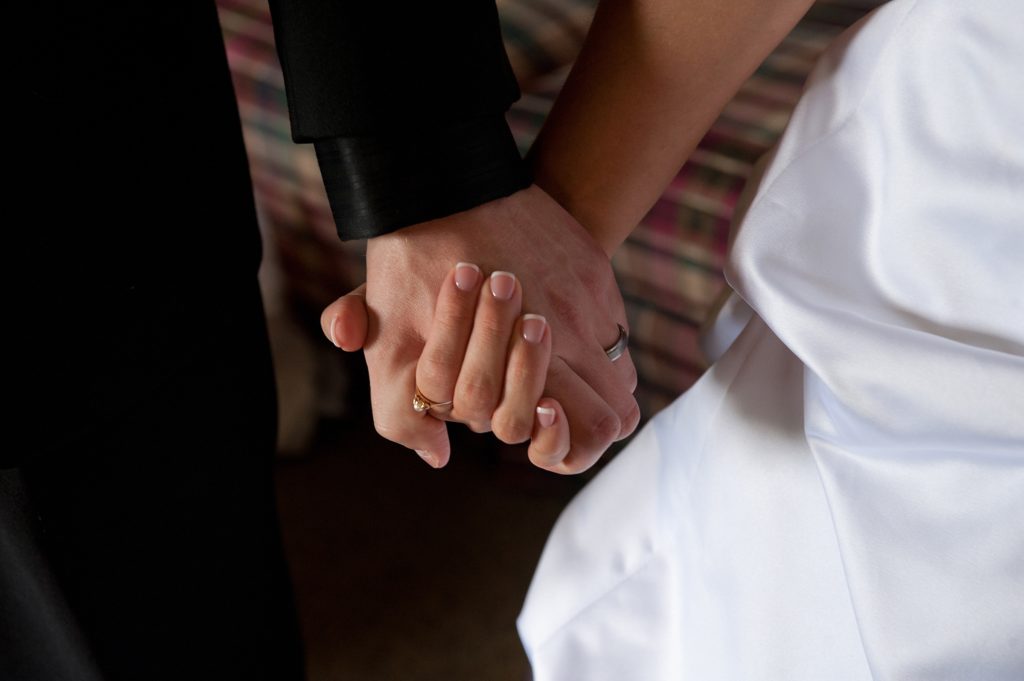I find that the one upside to round-the-clock newborn baby feeding is the chance to make headway on my reading list. To be sure, juggling a book and a baby requires some dexterity, but as a mother of three, I know that the first weeks with an infant provide the most reading time I’m likely to have for a while.
When I welcomed my third son this past January, I chose to devour “Get Married: Why Americans Must Defy the Elites, Forge Strong Families, and Save Civilization” (Broadside Books, $21.59) by University of Virginia sociologist Brad Wilcox — not exactly light reading for my late nights, but a title that had been on my radar since I last interviewed the author for these pages.
While it’s rife with data, “Get Married” stirred up something deeply personal. At several points in the book, I thought to myself, “What a privilege it is to be married, and to be married in this way.”

By “this way,” I mean to a man who shares my faith, who has what Wilcox describes as a “we-before-me” attitude, who sees rearing children as part and parcel of our shared life’s project, who sought a particular kind of education and employment primarily to provide for a family (and give me the option to stay home), and for whom divorce is not an option. As my husband likes to say, “We’re going down with the ship.”
Wilcox provides salient evidence as to why this type of marriage statistically yields higher levels of happiness, better economic stability, and more attractive prospects for children. Of course, by the grace of God we all go. Nothing in life is guaranteed. But for those looking to set themselves up for a meaningful life, the math alone supports his case.
But all of this presumes men and women buy into the idea of marriage as a meaningful path in the first place. For several generations now, the pursuit of happiness has been closely linked with maximizing our freedom and autonomy through solitary self-actualization. It’s had devastating effects, which Wilcox documents.
Just consider the mental health crisis among young Americans, our plummeting birthrate, the loneliness epidemic, the opioid crisis, the number of out-of-work men addicted to screens, the inability of the working class to find stability, and declining rates of female happiness despite wage gains and expanded opportunity. In my experience, it also includes living with the very real consequences of multiple generations of divorce.
Wilcox says the quiet part out loud: “From mainstream media outlets, on college campuses, in public schools, and on the floor of Congress, we hear that problems like these are about the economy, or failing schools, or inequality, or race, or inadequate public policies … [but] questions of marriage and family are better predictors of outcomes for people than the topics that currently dominate our public conversation. ...”
In light of the above, it’s worth writing again: it’s a privilege to be married.

In many ways, it feels like a miracle. At my bridal shower, my mother joked in her toast about how she wasn’t sure the day would ever come. I was 34, more than a decade older than she was when she got married. Though I suspect she thought my “two-Tom” rule was keeping me single (I said I was holding out for someone who could talk about Tom Brady as well as Thomas Aquinas), there was also a major cultural shift afoot that Baby Boomers were blind to. That they would get married and settle down was assumed. For me and my girlfriends, finding a man who was marriage-minded was like finding a needle in a haystack.
In large numbers, my peers have chosen to delay marriage and childbearing, choosing instead to cohabit, travel, move every few years to a new city and try their hand at caring for someone else by getting a pet. We are paralyzed by the overwhelming choices we have — including an endless number of potential partners available online.
I can’t count the number of grandmothers I meet at our local park who lament that they have only one grandchild and realistically have only “a few good years” with them. Sadly, the data suggests that Boomers are reaping what they sowed.
Wilcox’s research puts a fine point on how we got here: the dismantling of sexual norms, including no-fault divorce, putting a premium on family diversity rather than family stability (which disproportionately hurts the working class and poor); “blank slate feminism,” which promised but failed to deliver women greater levels of happiness if they joined the workforce, outsourced child care, or opted not to have kids; and a pornified, digitized world, in which young Americans are taught to ignore sex and gender differences.
Equally sad is the fact that many men and women who do want to get married cannot afford to do so: working-class couples are penalized by our tax code and the economic reality of “the two-income trap” such that getting married takes money out of their wallets and food off their children’s tables.

Marriage should not be a luxury lifestyle option for the college-educated. It should be something that most men and women can enter into and in which they can thrive.
But there is good news. Marital quality is highest among those who are religious, hold more traditional views of sex and gender, welcome children within a stable union, and put their family first. In other words, when men and women get married the way the Church has always proposed, they and their children report higher levels of happiness, stability, and hope for their future. Decades upon decades of dismantling that norm has given us the sociological data to support that it works — a silver lining, if there was any.
It would be easy to despair at what Wilcox calls the “closing of the American heart.” But as I read his book, I kept thinking about Mother Teresa’s well-quoted counsel: “If you want to change the world, go home and love your family.” All that is within my power is to show my husband and sons what a privilege it is to love them, with the hope that they, too, know and yearn for such joy.

